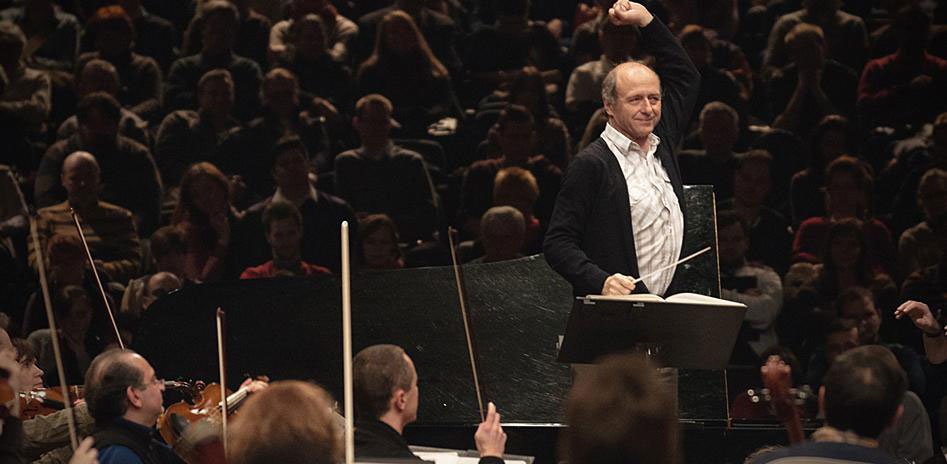Entering the concert hall is like arriving at a cheerful after-school supervision session: people are sitting, lying and walking all around and even stumbling over one another. Some of them are holding an instrument, others are just lying and rolling about. Someone in the middle starts waving their hands, they’ve found an extra place, but their acquaintance can’t hear them; Iván Fischer, standing nearby, grabs the conductor’s microphone and conveys the young man’s message through the loudspeaker, repeating what he said, word for word. The acquaintance gets there eventually, whilst the crowd lying around just laugh. The audience keep laughing – I don’t think they believed a classical music concert really can be cool. Yes, it can, which enchanted everyone and ensured a light-hearted mood.
Finally, there was the familiar buzz when musicians check if everything is tuned correctly. A conductor and host at the same time, Iván Fisher briefly introduced Sergei Prokofiev – the essence being that music means three things for him: lyric, rhythm and sarcasm – and introduced Alexander Toradze. Toradze at the piano; no-one can play Prokofiev better than him. And then Piano Concerto No. 3 (in C major) started.
I really liked Prokofiev’s three concepts, so I watched them dominate over each other throughout the concert. Indeed, the performance was so lyrical at some points that even the piano’s subtle sounds seemed to fall on us like a dead weight. The sections with a stronger rhythm were cued by Fischer in advance with a thundering whoosh. He drew in a sharp breath, his hands flew into the air, and the music changed. I found sarcasm above all in the cello’s distant sounds and in the disturbing clicks of a camera shutter.
I lay just behind the piano, which was good and bad at the same time. Good because I felt as if the sounds were flowing around me, and I felt the stronger strikes on the keys reaching my legs through the concrete. This was a much better place for spectators than the stand-like location where I sat last year. Nevertheless, next time I will try to arrive earlier – the seating arrangement is on a first come first served basis – and sit on a beanbag near the podium. There it just can’t happen that in the midst of the most profound silence I hear the piano before the drums. And I won’t be one of those either who will be advised by Toradze with a polite smile on his face to shield their ears when necessary. Since they are sitting beside the piano...
The piano concerto ended. Toradze bowed, received rapturous applause, and went out. Even louder applause when he returned – to pick up his scarf he had left there.
Then Fischer started to tell us stories again. It is difficult to perform when musicians are so far away, yet the audience is sitting close, which is good. Incidentally, Prokofiev died on the same day as Stalin, but great as he was, the press had no time to mourn the composer. Besides being a musician, Alexander Porfiryevich Borodin, composer of the Polovtsian Dances – an extract from the opera Prince Igor – was also a chemist. The story of Prince Igor goes back to the 11th century when Khan... Khan Kun... Khan Konchak... Fischer struggled for words, the audience was laughing of course.
And when they started to play the second piece of the concert, some of the audience suddenly sprang to their feet. So quickly that I had no time even to be surprised. One or two spectators at every point in the hall, even in the furthest corner, were now standing with a folder in their hands and singing. It was completely unexpected and beautiful; and you thought that all you need is a folder in your own hand to sing along. But of course, this is not so easy; as it turned out, these people were members of the Czech Philharmonic Choir from Brno. They will next perform a lyrical tale by Dvořak in Hungary, in May, in collaboration with the Festival Orchestra.
The concert ended, but nobody wanted to leave. The clapping and tapping only stopped following a gesture by the conductor. In the very end, it was promised that next time there will be more beanbags, since even the performers can be enthralled by this type of concert.


